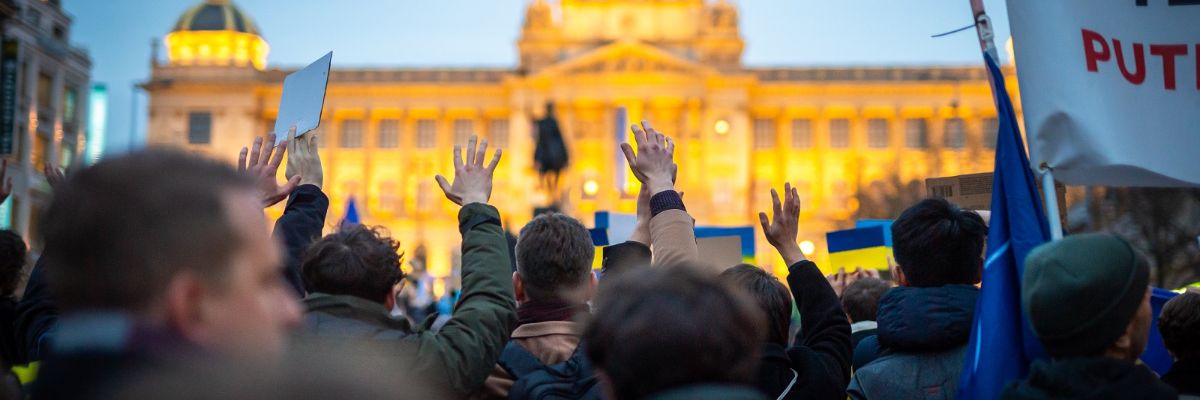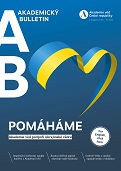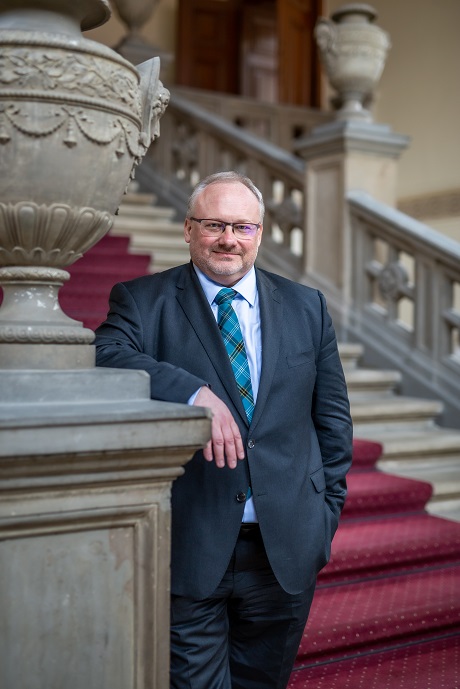
The vast majority of CAS institutes have joined the Help for Ukraine iniciative
12. 04. 2022
Following the invasion of Ukraine by the Russian Federation on 24 February 2022, the Czech Academy of Sciences soon came out with an offer of support in the form of fellowships for (post)doctoral researchers who are fleeing the war-ridden country. “The Academy wants to support at least 50 Ukrainian researchers by the end of 2023,” David Honys, member of the Academy Council, said in his interview for the AB / Academic Bulletin e-magazine in March. The first 22 fellowship applications were approved by the Academy Council on 12 April 2022.
The newly approved list includes a slightly higher number of applicants interested in the natural sciences, but candidates for jobs at the Institute of the Czech Language, the Institute of Archaeology, and the Institute of Philosophy of the CAS have also been successful. In the near future, the CAS will decide on other applications, the number of which is gradually increasing.
The opportunity to continue research in a safe environment is provided by the Researchers at Risk Fellowship programme, which was approved by the Academy Council of the CAS on 8 March 2022. Those interested in the fellowship must apply through individual CAS institutes. For up-to-date information regarding the conditions, please visit the Help for Ukraine page.
“This year, the fellowship will focus on applicants from Ukraine, after which the programme will consider applications from other countries where researchers are threatened by war or persecution. The Academy wants to support at least 50 Ukrainian researchers by the end of 2023,” explains David Honys from the Academy Council, with whom we spoke about the immediate response of our institution for the AB / Academic Bulletin e-magazine, a periodical intended primarily for the personnel of the Czech Academy of Sciences:

3/2022 (version for browsing)
3/2022 (version for download)
The Academy and its institutes have expressed unequivocal support for Ukraine. What was your reaction to the attack that came in the early morning hours of 24 February 2022?
I felt immense disappointment and sadness. But unfortunately, it didn’t come as a complete surprise. In fact, the imminent risk of a Russian invasion had existed since 21 February 2022, when President Putin, in a speech I consider quite incredible, recognised the two self-declared separatist “republics” in eastern Ukraine. From that moment on, it was only a matter of time before Russia intervened militarily.
What were the first official steps undertaken by the Academy?
I consider it important to point out that the Academy Council managed to reach a consensus on the very morning of the first day of the war. The Academy could thus do the right thing and take a stand in support of Ukraine, categorically condemning the unprovoked invasion by the Russian Federation. But, of course, our activities could not end there. We immediately started to plan specific types of aid for Ukraine and refugees who had already begun arriving to the Czech Republic.
Did the individual CAS institutes get involved?
From the very beginning of the war, the institutes began to respond to the situation spontaneously in various ways. That’s why we started working with them to coordinate the aid. Considering all the horrors we’ve been following practically live in the past weeks, it’s admirable and encouraging to see how many people have become actively involved in the relief efforts, thanks to whom the Academy was also able to launch the web portal Help for Ukraine within a few days, where support and opportunities are being presented and updated.
In addition to expressing moral support for Ukraine, the Academy established the Researchers at Risk Fellowship programme. Was it a logistical challenge to get it up and running as quickly and efficiently as possible?
I’d say it was a challenge overall, because we basically “fast-tracked” the approval and implementation of the programme. This was an extraordinary procedure which, of course, required a high level of commitment from our colleagues involved in the preparations. Normally, it takes several months to prepare a similar programme including the relevant grant application. In this case, however, we had to prepare the complete programme for approval by the next meeting of the Academy Council – just over a week away from the start of the war.
Coincidentally, we had already been preparing a proposal for a similar program at the Division of International Cooperation of the CAS Head Office. However, we didn’t think that it would be needed so soon and on such a massive scale. Although this made our task slightly easier, our original idea had been much more modest. We therefore approved the Researchers at Risk Fellowship as a general programme, with each separate call specifying which countries qualify.

David Honys, member of the Academy Council of the CAS
What is the focus of the programme?
The general goal of the programme is to support researchers whose scientific work in their home country is jeopardised by persecution, war, or other threats. It will enable them, now or in the future, to continue their research in safe conditions in the Czech Republic. We have included Ukraine in the pilot phase of the 2022 programme, where scientific research and, indeed, normal life is prevented by war. We expect it will be possible to submit proposals regarding the integration of researchers from Ukraine into the CAS institutes until the end of September 2022.
Under which conditions can researchers from Ukraine participate in the programme?
We designed the programme to be very inclusive, so it is easy to fulfil the basic requirements. Researchers from all fields can apply on condition that they must both become a new employee of a CAS institute and be made part of a research team or department of that institute. The programme is aimed at PhD students and (postdoctoral) researchers.
Can the Academy also provide them with accommodation?
The Academy itself doesn’t have its own accommodation facilities, but many of its institutes do. Almost immediately after the start of the Russian invasion, several institutes offered their capacities to accommodate Ukrainian researchers and their families, often with young children. Among the first to do so were the Institute of Organic Chemistry and Biochemistry, the Institute of Vertebrate Biology, and the Institute of Animal Physiology and Genetics, with the Centre of Administration and Operations also offering additional capacities. The first families from Ukraine arrived in early March and have already found accommodation. However, this list is by no means definitive and will be out of date by the time the March issue of the AB / Academic Bulletin e-magazine is published. Additional institutes are joining in on the endeavour.
What is the capacity of the programme – is there a limit you’ve set?
We expect to support at least 50 Ukrainian researchers by the end of 2023. However, we are aware that the situation is changing dynamically, and we will respond to current developments.
How many people have already taken advantage of the programme?
There is a lot of interest in the programme. One concrete indicator is the number of applications submitted. As of 22 March, we already had eight proposals from seven institutes. But this concerns the submitted applications alone – there is a greater demand for information. The Division of International Cooperation is approached daily by CAS institutes with requests for additional information. Many Ukrainian researchers write to us with similar questions. This goes to show that people are actively interested in the support programmes and will find their way to the information.
We must also note that several institutes employ researchers and staff from Ukraine as part of their projects – i.e., outside the Researchers at Risk Fellowship programme. Because they operate as separate units, we don’t have all the up-to-date information. However, we know from conversations with colleagues that, for instance, the Institute of Physics has already employed at least seven Ukrainian researchers. The situation is similar at the Biology Centre and the Institute of Experimental Botany.
How do you coordinate with institutes that want to get involved? Who can they contact?
I informed the directors of the CAS institutes about the programme and its parameters by letter soon after we launched it, together with a request to keep us informed about the forms of assistance their institutes plan to provide or get involved in. This information is collected by the Division of International Cooperation and with the help of the Centre of Administration and Operations is published on the CAS website under the “Help for Ukraine” section. The contact person is Markéta Říhová, who is in touch not only with colleagues from the CAS institutes, but also with individuals interested in the offered aid. We then provide them with contacts to specific institutes according to their area of expertise.
How many institutes have already gotten involved?
The vast majority of CAS institutes have become involved in helping Ukraine. Not just the institutes I mentioned before. But I’m not sure of the exact number at the moment.
How did the Euraxess Centre, which specialises in providing assistance to colleagues from abroad, get involved?
We cooperate with the Euraxess Centre even under normal circumstances. Its staff provides colleagues coming from abroad with assistance in connection with the immigration process, including in-person assistance when dealing with the authorities or integrating into Czech society. At the moment, Euraxess has increased its assistance services for incoming researchers and we consider them a key partner with whom we share information and coordinate the whole process.
The Czech Academy of Sciences has terminated or suspended cooperation with Russian and Belarusian research institutes. Did the CAS institutes support this decision?
We have terminated our agreement with the National Academy of Sciences of Belarus. The Academy Council has also advised the CAS institutes to suspend or terminate cooperation with Russian and Belarusian research institutions. We issued this recommendation because freedom of research without political influence cannot be guaranteed in these countries, which goes against our way of understanding science. So far we haven’t encountered any negative reactions. We’ve received mostly positive reports that the termination of contracts had begun even before we issued the recommendation which, however, concerns institutional relations only. At the individual level, it is up to the institutes whether to continue informal cooperation with researchers in these countries. The principle of collective responsibility cannot be applied in this case either. Many Russian and Belarusian researchers have condemned the invasion of Ukraine.
How will this interruption of international research projects affect existing projects and their funding? Are the CAS institutes involved in projects that are, say, of strategic importance?
It is unlikely that the impact of the discontinued collaborations will be significant for most institutes. Among other things, this is because neither Russia nor Belarus are among our key international partners. One exception is, for example, space research. The war will have a negative impact on the operation of the International Space Station and the upcoming ExoMars 2022 mission, which is being carried out together with the European Space Agency and Roscosmos. It is now clear that the launch of the mission to Mars, scheduled for 20 September 2022, will be postponed at the very least.
[...]
You can read the entire interview in the AB / Academic Bulletin e-magazine. All issues (in Czech) are available free and online on our website.
3/2022 (version for browsing)
3/2022 (version for download)
Prepared by: Luděk Svoboda, Division of External Relations, CAO of the CAS
Translated by: Tereza Novická, Division of External Relations, CAO of the CAS
Photo: Jana Plavec, Division of External Relations, CAO of the CAS
 Texts and photographs are released for use under the Creative Commons license.
Texts and photographs are released for use under the Creative Commons license.
Read also
- A trapped state: The pandemic impact on public attitudes, trust, and behavior
- Aerial archaeology: Tracing the footsteps of our ancestors from the sky
- Archaeologists uncover ancient finds along Prague Ring Road
- Our microbiome largely depends on what we eat, says microbiologist Michal Kraus
- The ABCs of writing: Why did its invention mark a turning point for humankind?
- We learn, remember, forget… What can memory actually do? And can we outsmart it?
- New Center for Electron Microscopy in Brno opens its doors to global science
- The hidden lives of waste: What can we learn from waste workers and pickers?
- A unique lab is hidden right beneath Prague’s Vítkov Hill
- Renewables are a strategic investment in European security, scientists say
The Czech Academy of Sciences (the CAS)
The mission of the CAS
The primary mission of the CAS is to conduct research in a broad spectrum of natural, technical and social sciences as well as humanities. This research aims to advance progress of scientific knowledge at the international level, considering, however, the specific needs of the Czech society and the national culture.
President of the CAS
Prof. Eva Zažímalová has started her second term of office in May 2021. She is a respected scientist, and a Professor of Plant Anatomy and Physiology.
She is also a part of GCSA of the EU.